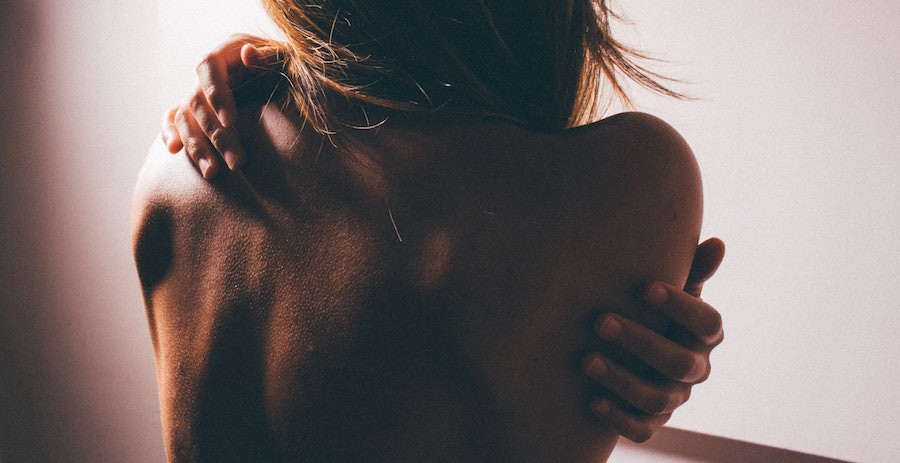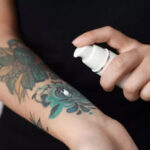Are you wondering if you can get a tattoo with acne? It’s a valid concern, especially if you’re planning to express yourself through body art. At tattooat.com, we believe in making informed decisions about your skin and tattoos, ensuring both the art and your skin’s health flourish. This guide will help you understand the risks and provide solutions for achieving a tattoo you’ll love for years to come. Dive in to learn about skin conditions, tattoo aftercare, and professional tattoo advice.
1. Why Tattooing Over Acne Is Not Recommended
Tattooing over acne is generally not recommended because active acne can compromise the skin’s surface and lead to several complications.
1.1 Risks of Tattooing Over Acne
Here are some potential risks:
- Infection: Acne breakouts involve inflammation and often harbor bacteria. Tattooing over these areas introduces a pathway for infection, potentially leading to more severe skin issues.
- Compromised Tattoo Quality: The uneven surface caused by acne can prevent the tattoo artist from creating a smooth, consistent design. Ink may not distribute evenly, resulting in a patchy or blurred appearance.
- Prolonged Healing: Tattooing already inflamed skin can extend the healing process. The body has to work harder to repair both the tattoo and the acne, increasing the risk of scarring.
- Ink Pigment Issues: Active acne can cause ink to settle improperly within the pores, leading to a blemished appearance. According to dermatologists, this can affect the tattoo’s long-term vibrancy and clarity.
1.2 Professional Tattoo Artists’ Perspective
Most professional tattoo artists prioritize the health and integrity of your skin. They typically refuse to tattoo over active acne to ensure the best possible outcome and minimize risks. Artists often recommend waiting until the skin clears up before proceeding with the tattoo.
2. Understanding Different Types of Acne
Acne isn’t just one thing; it comes in various forms, each with different implications for tattooing.
2.1 Types of Acne and Their Impact on Tattooing
| Type of Acne | Characteristics | Impact on Tattooing |
|---|---|---|
| Blackheads | Open pores clogged with oil and dead skin cells | Generally less problematic if not inflamed, but tattooing directly over them can still lead to irritation and potential infection. |
| Whiteheads | Closed pores clogged with oil and dead skin cells | Similar to blackheads, tattooing over whiteheads can cause inflammation and uneven ink distribution. |
| Papules | Small, raised, and tender pink bumps | Indicates inflammation. Tattooing over papules can worsen inflammation, increase infection risk, and affect tattoo quality. |
| Pustules | Papules with pus at their tips | Significant infection risk. Tattooing over pustules is highly discouraged due to the potential for spreading bacteria and compromising the healing process. |
| Nodules | Large, solid, painful lumps under the skin | Deep inflammation. Tattooing over nodules is extremely risky, leading to severe complications and scarring. |
| Cysts | Painful, pus-filled lumps under the skin | Severe infection risk. Tattooing over cysts is highly discouraged and can lead to significant health issues, prolonged healing, and permanent damage to the tattoo’s appearance. |
2.2 Identifying Acne-Prone Areas
Certain areas of the body are more prone to acne. These include:
- Face: Forehead, nose, and chin (T-zone).
- Back: Especially the upper back and shoulders.
- Chest: Often affected due to sweat and oil gland concentration.
- Neck: Particularly along the hairline.
If you’re planning a tattoo in these areas, take extra precautions to manage and prevent acne breakouts.
3. Can You Tattoo Over Acne Scars?
Tattooing over acne scars is possible and often done to camouflage or minimize their appearance. However, it’s essential to understand the considerations involved.
3.1 Types of Acne Scars Suitable for Tattooing
- Flat, Discolored Scars: These scars, also known as post-inflammatory hyperpigmentation or hypopigmentation, are the easiest to tattoo over. The texture of the skin is generally smooth, allowing for even ink distribution.
- Slightly Raised (Hypertrophic) Scars: These scars are slightly raised but still have a relatively smooth surface. A skilled tattoo artist can often work with these scars to create a design that minimizes their appearance.
3.2 Types of Acne Scars Less Suitable for Tattooing
- Ice Pick Scars: Deep, narrow, pitted scars that are difficult to tattoo over due to their irregular shape and depth.
- Boxcar Scars: Round or oval depressions with sharply defined edges. Similar to ice pick scars, their depth and shape make them challenging for tattooing.
- Rolling Scars: Broad, wave-like depressions that create an uneven skin surface. Tattooing over rolling scars can result in an inconsistent and unsatisfactory appearance.
- Keloid Scars: Raised, thick scars that extend beyond the original injury site. Tattooing over keloids is not recommended as it can stimulate further growth and complications.
3.3 Consulting with a Tattoo Artist
Always consult with an experienced tattoo artist who can assess your scars and provide personalized advice. They can determine whether your scars are suitable for tattooing and suggest designs that will effectively camouflage them.
4. Preparing Your Skin Before a Tattoo Appointment
Proper skin preparation is crucial to minimize the risk of acne breakouts and ensure the best possible tattoo outcome.
4.1 Skincare Routine Leading Up to the Appointment
- Gentle Cleansing: Use a mild, non-comedogenic cleanser to keep the area clean without over-drying.
- Exfoliation: Gently exfoliate 2-3 times a week to remove dead skin cells and prevent clogged pores. Avoid harsh scrubs that can irritate the skin.
- Moisturizing: Keep the skin hydrated with a light, oil-free moisturizer. Hydrated skin is healthier and more receptive to tattooing.
- Avoid Irritants: Steer clear of harsh chemicals, fragrances, and potential allergens in skincare products.
4.2 Dietary and Lifestyle Adjustments
- Hydration: Drink plenty of water to keep your skin hydrated from the inside out.
- Balanced Diet: Eat a balanced diet rich in vitamins and antioxidants to support skin health. Limit sugary and processed foods, which can contribute to acne.
- Stress Management: Practice stress-reducing activities such as yoga, meditation, or exercise. Stress can trigger acne breakouts.
- Sleep: Get adequate sleep to allow your skin to repair and regenerate.
4.3 Products to Avoid Before Tattooing
- Acne Treatments: Avoid using harsh acne treatments like benzoyl peroxide or salicylic acid in the days leading up to your appointment, as they can dry out and irritate the skin.
- Retinoids: Discontinue the use of retinoids (like Retin-A) a week or two before your appointment, as they can thin the skin and increase sensitivity.
- Alcohol and Caffeine: Avoid excessive alcohol and caffeine consumption, as they can dehydrate the skin.
5. What to Do if You Have a Breakout Before Your Appointment
If you experience an acne breakout close to your tattoo appointment, the best course of action is to reschedule.
5.1 Contacting Your Tattoo Artist
Communicate openly with your tattoo artist. Explain the situation and ask for their advice. Most artists appreciate the honesty and will gladly reschedule your appointment.
5.2 Treatment Options for a Quick Recovery
- Spot Treatments: Use spot treatments containing salicylic acid or benzoyl peroxide to target individual pimples.
- Warm Compresses: Apply warm compresses to the affected area to reduce inflammation and promote healing.
- Hydrocolloid Bandages: These bandages can help absorb pus and reduce inflammation, speeding up the healing process.
5.3 Why Rescheduling Is the Best Option
Rescheduling ensures that your skin is in the best possible condition for tattooing, reducing the risk of complications and ensuring a better outcome for your tattoo.
6. Tattoo Aftercare and Acne Prevention
Proper aftercare is essential to prevent acne breakouts and promote healing after getting a tattoo.
6.1 Immediate Aftercare Steps
- Keep the Area Clean: Gently wash the tattooed area with a mild, fragrance-free soap and warm water.
- Pat Dry: Pat the area dry with a clean paper towel. Avoid rubbing, which can irritate the skin.
- Apply Aftercare Ointment: Apply a thin layer of tattoo aftercare ointment, such as Aquaphor or a specialized tattoo balm.
- Avoid Tight Clothing: Wear loose-fitting clothing to allow the tattoo to breathe and prevent friction.
6.2 Long-Term Skincare for Tattooed Skin
- Moisturize Regularly: Keep the tattooed area moisturized to prevent dryness and itching.
- Sun Protection: Protect your tattoo from the sun by applying a broad-spectrum sunscreen with an SPF of 30 or higher. Sun exposure can fade the ink and damage the skin.
- Avoid Harsh Products: Steer clear of harsh chemicals, fragrances, and potential allergens in skincare products.
- Stay Hydrated: Drink plenty of water to keep your skin hydrated and healthy.
6.3 Recognizing Signs of Infection
- Excessive Redness: Some redness is normal, but excessive or spreading redness could indicate an infection.
- Swelling: Significant swelling around the tattoo.
- Pain: Increasing pain or tenderness.
- Pus or Drainage: Any discharge from the tattoo.
- Fever: Feeling feverish or experiencing chills.
If you notice any of these signs, seek medical attention immediately.
7. Alternative Tattoo Locations
If you’re prone to acne in certain areas, consider alternative tattoo locations that are less likely to break out.
7.1 Lower Risk Areas for Breakouts
- Upper Arms: Generally less prone to acne compared to the face, back, and chest.
- Forearms: Similar to upper arms, forearms are often less susceptible to breakouts.
- Calves: Another relatively low-risk area for acne.
7.2 Considerations for Tattoo Design and Placement
- Size and Complexity: Choose a design that fits well in the chosen location and allows for proper healing and maintenance.
- Skin Sensitivity: Consider the sensitivity of the skin in the chosen area. Some areas may be more sensitive to pain and irritation.
- Visibility: Think about how visible you want the tattoo to be and choose a location that aligns with your personal preferences and lifestyle.
8. Working with Your Tattoo Artist
Building a strong relationship with your tattoo artist is essential for a positive and successful tattoo experience.
8.1 Communicating Your Concerns
Be open and honest with your tattoo artist about your skin concerns, including acne and any other skin conditions. They can provide valuable advice and guidance based on their experience and expertise.
8.2 Choosing the Right Artist for Your Skin Type
Look for an artist who has experience working with different skin types and conditions. Read reviews and ask for recommendations to find an artist who is knowledgeable and skilled in handling sensitive skin.
8.3 Following Their Recommendations
Trust your tattoo artist’s judgment and follow their recommendations regarding skin preparation, aftercare, and any other concerns. They have your best interests at heart and want to ensure you get a beautiful and healthy tattoo.
9. Medical and Dermatological Advice
Consulting with medical professionals can provide additional support and guidance for managing acne and ensuring a safe tattooing experience.
9.1 When to Consult a Dermatologist
- Severe Acne: If you have severe acne that is difficult to manage with over-the-counter treatments.
- Persistent Breakouts: If you experience frequent and persistent breakouts in the area you want to tattoo.
- Skin Conditions: If you have any underlying skin conditions that may affect the tattooing process.
9.2 Medical Treatments for Acne
- Topical Medications: Prescription-strength creams and gels containing retinoids, benzoyl peroxide, or antibiotics.
- Oral Medications: Oral antibiotics, hormonal birth control pills, or isotretinoin (Accutane) for severe acne.
9.3 Risks of Tattooing While on Acne Medication
Certain acne medications, such as isotretinoin, can thin the skin and increase sensitivity, making it more prone to damage during tattooing. Always inform your tattoo artist about any medications you are taking.
10. Frequently Asked Questions (FAQs)
10.1 Can I tattoo over a pimple if it’s small?
No, even small pimples can introduce bacteria and affect ink distribution. It’s best to wait until your skin is clear.
10.2 How long should I wait after an acne breakout to get a tattoo?
Wait until the area is fully healed and the skin has returned to its normal texture and appearance. This may take several weeks.
10.3 Can I use acne medication on a new tattoo?
Avoid using acne medications on a new tattoo, as they can irritate the skin and interfere with healing. Follow your tattoo artist’s aftercare instructions.
10.4 What if I get a pimple on my tattoo after it’s healed?
Treat it gently with a mild acne spot treatment. Avoid picking or squeezing, which can damage the tattoo.
10.5 Can I get a tattoo if I have acne-prone skin?
Yes, but take extra precautions to manage your skin and prevent breakouts before and after tattooing.
10.6 Will a tattoo make my acne worse?
If proper precautions are taken, a tattoo should not make your acne worse. However, poor hygiene or improper aftercare can increase the risk of breakouts.
10.7 Can a tattoo help cover up acne scars?
Yes, a tattoo can effectively camouflage acne scars, especially flat, discolored scars.
10.8 How do I find a tattoo artist who is experienced with acne-prone skin?
Read reviews, ask for recommendations, and look for artists who have experience working with different skin types and conditions.
10.9 What type of tattoo design is best for acne-prone areas?
Simpler designs with fewer fine details may be better for acne-prone areas, as they are less likely to be affected by uneven skin texture.
10.10 Can I use hydrocolloid bandages on a new tattoo if it gets a pimple?
Consult with your tattoo artist before using hydrocolloid bandages on a new tattoo, as they may interfere with the healing process.
 Tattooing Over Acne
Tattooing Over Acne
Alt text: Close-up of skin with acne breakout, illustrating why tattooing over acne is not recommended due to the risk of infection and compromised tattoo quality.
Conclusion
Getting a tattoo with acne requires careful consideration and planning. While it’s generally not recommended to tattoo over active breakouts, there are ways to manage your skin and minimize the risks. By understanding the different types of acne, preparing your skin properly, and working closely with your tattoo artist, you can achieve a beautiful tattoo that you’ll love for years to come.
Ready to explore tattoo designs, find skilled artists, and learn more about tattoo aftercare? Visit tattooat.com today and embark on your tattoo journey with confidence!

